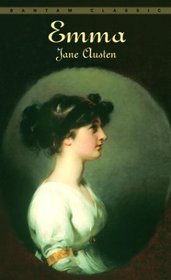Helpful Score: 4
Emma Woodhouse, the title character of this wonderful book, thinks that she would be a good matchmaker. She lives on an estate in the English countryside with her father, her sister, and, until recently, her best friend and former governess, Miss Taylor. Miss Taylor recently married a man Emma introduced her to. So, with this success, Emma feels that her matchmaking career has begun.
Unfortunately, Emma is lacking in two essential qualities for the job. As Austen says she is "handsome, clever, and rich, with a comfortable home and a happy disposition.." but she is not very observant and does not yet understand the human heart.
It can be difficult for today's reader to get into books by Jane Austen. She wrote her books in the early 19th century and often wrote about life in the English countryside, a setting far from our own experience. The pace of the books is slower and the descriptions longer than we are used to, and the characters are often not able to say quite exactly what they mean. The books were written for a different audience at a much different time.
Also, the books are long; they are definitely not the fast-paced, action-packed thrillers we love to read today. Austen's books require a different kind of reader: one who has some time: one who can slow down and savor the characters and the story.
Because, unlike her heroine, Jane Austen is observant and does understand the human heart. The characters she describes are the principal joy of this book and, once you get to know them, you will find that you already know others like them. Besides bright but slightly bored Emma, we find here the eccentric Mr. Woodhouse, always concerned about his health and the health of other, the dull Miss Bates, always chattering away about nothing, the pliant Harriet, whose life Jane almost ruins, the ambitious Mr. Elton, a self-centered social climber, and Mr. Knightly, Emma's friend and gentle critic.
This book will reward those who can make their way into the story, who can step away a little from the fast pace of life today and enjoy some familiar people who lived long ago.
Unfortunately, Emma is lacking in two essential qualities for the job. As Austen says she is "handsome, clever, and rich, with a comfortable home and a happy disposition.." but she is not very observant and does not yet understand the human heart.
It can be difficult for today's reader to get into books by Jane Austen. She wrote her books in the early 19th century and often wrote about life in the English countryside, a setting far from our own experience. The pace of the books is slower and the descriptions longer than we are used to, and the characters are often not able to say quite exactly what they mean. The books were written for a different audience at a much different time.
Also, the books are long; they are definitely not the fast-paced, action-packed thrillers we love to read today. Austen's books require a different kind of reader: one who has some time: one who can slow down and savor the characters and the story.
Because, unlike her heroine, Jane Austen is observant and does understand the human heart. The characters she describes are the principal joy of this book and, once you get to know them, you will find that you already know others like them. Besides bright but slightly bored Emma, we find here the eccentric Mr. Woodhouse, always concerned about his health and the health of other, the dull Miss Bates, always chattering away about nothing, the pliant Harriet, whose life Jane almost ruins, the ambitious Mr. Elton, a self-centered social climber, and Mr. Knightly, Emma's friend and gentle critic.
This book will reward those who can make their way into the story, who can step away a little from the fast pace of life today and enjoy some familiar people who lived long ago.





